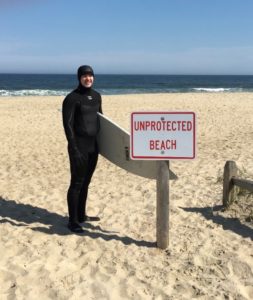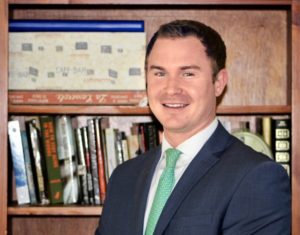How to stop kicking the can and pick it up
By Patrick McDevitt
My name is Patrick McDevitt and I am a financial advisor at Morgan Stanley. I don’t know what image that conjures. Is it a sharply dressed man with slicked back hair and expensive shoes? Is it a 180 pound blood sucking insect? Is it a 28 year old surfer who always loved stocks, bonds, and the environment? I doubt it was the last one, but that’s who I am.

Patrick standing at the Unprotected Beach sign
From a young age, the ocean has always been a place of wonder and comfort for me. From surfing at all hours to catch the perfect wave, to crabbing with my friends, hopeful to pull up a few tasty critters as the perfect complement to our family’s Sunday sauce, to learning everything I could possibly know about my local beaches. Living so close to the water has genuinely shaped the person I have become and my passion for keeping our oceans and the environment clean only intensifies with age.
I am a volunteer of the Surfrider foundation; I participate in their beach cleanups. I take part in wheels to water, a charity which helps disabled veterans and others enjoy the wonder of surfing. I have grown and taken care of oyster beds in my hometown. I belong to my local Rotary Club. I have always wanted to make an impact.
My interest for stocks and bonds developed later when I had the chance to watch my Father on the floor of the New York Stock Exchange at age 12. From then on, I was determined to excel in the financial world. After graduating at The College of Charleston, I have held jobs at Cowen and Company, Jefferies, JP Morgan Chase, and Morgan Stanley, all to quell my curiosity about the markets and to teach myself how best to invest client funds, as well as my own.
The famous investor and world’s third richest man, Warren Buffett, explained why he didn’t invest in technology companies years ago by coining the phrase, “I only buy what I can understand.” Well, I want you to only buy what you can stand for.
I see a path where I can meld my two passions and make an outsized impact on the world. Increasingly, investors are defining long-term value as not only realizing attractive returns, but also generating positive social and environmental impact. That is why I want to become a champion for the ESG investing universe. ESG stands for Environmental Social and Governance. Investopedia describes ESG as using Environmental criteria to look at how a company performs as a steward of the natural environment. Social criteria examines how a company manages relationships with its employees, suppliers, customers, and the communities where it operates. Governance deals with a company’s leadership, executive pay, audits, internal controls, and shareholder rights. A myth about this type of investing is that by investing in your passions you will have to sacrifice. This could not be further from the truth; you will not need to place your IRA on the altar. In reality, sustainable funds have often performed better with lower volatility than traditional funds. This has happened for many reasons, but the facts are that the annualized return from May 1, 1990 to August 31, 2017 of the MSCI KLD 400 Social Index was 11%. While at the same time the Standard and Poor’s returned 10.5%.

Patrick McDevitt
In 2015, Morgan Stanley’s Institute for Sustainable Investing conducted a study examining performance data of over 10,000 open-end mutual funds and over 2,800 separately managed accounts in the U.S. over seven years – comparing sustainable strategies and traditional funds. The results showed that funds investing in sustainability usually met, and often exceeded, the performance of comparable traditional investments. The study also found a positive relationship between corporate investment in sustainability and both stock price and operational performance.
I quote the aforementioned study saying “Sustainable equity strategies met / exceeded median returns and met / fell below median volatility of traditional funds for 64% of the periods examined, compared to traditional strategies.” This is huge! If it were only 51% it would prove that sustainable investing was a favorable option. It is a whopping 14% better when taking into account both returns and volatility.
So let’s review what we just went over.
Investing with an impact will:
Put pressure on companies to be sustainable………………………………………………………..Check
Create a cleaner, more resource abundant world for posterity……………………………..Check
Make you a reasonable amount of money with low volatility………………………………..Check
Allow you to sacrifice nothing……………………………………………………………………………….Check
So you may be thinking “if this is such a no brainer why didn’t my current advisor bring it up?”
And the answer to that is… I don’t know, but they should have. Investing with an impact is no longer a niche area. It is a new investing wave, and as a surfer I know exactly what to do with waves. In fact, sustainably invested assets now account for over 8.72 Trillion—or, more than one out of every five dollars—under professional management in the U.S. It’s big, it’s good, and it’s growing. Be a part of the future.
I don’t want my claims to sounds too grand, but what my financial experience has taught me is responsibility. All of your actions matter. Responsibility on a large enough scale will change the world for the better. If you take responsibility for yourself and your actions, including your investments, you can also take responsibility for the world being a better place. This is a call to action. Every dollar you send into the world makes an impact. What do you want your impact to be? If you could change the world, and beat the market… would you do it?
Keep in touch with Patrick:
Email: Patrick.mcdevitt@morganstanley.com
Phone: 732-389-8603
Disclosures
- This material does not provide individually tailored investment advice. It has been prepared without regard to the individual financial circumstances and objectives of persons who receive it. The strategies and/or investments discussed in this material may not be suitable for all investors. Morgan Stanley Smith Barney LLC recommends that investors independently evaluate particular investments and strategies, and encourages investors to seek the advice of a Financial Advisor. The appropriateness of a particular investment or strategy will depend on an investor’s individual circumstances and objectives. This material is not an offer to buy or sell any security or to participate in any trading strategy. Asset allocation and diversification do not guarantee a profit or protect against a loss. Past performance is no guarantee of future results.
- Private Funds (which include hedge funds and private equity funds) often engage in speculative investment techniques and are only suitable for long-term, qualified investors. Investors could lose all or a substantial amount of their investment. They are generally illiquid, not tax-efficient and have higher fees than many traditional investments.
- Investing in the market entails the risk of market volatility. The value of all types of investments may increase or decrease over varying time periods. Fixed Income investing entails credit risks and interest rate risks. When interest rates rise, bond prices generally fall.
- The returns on a portfolio consisting primarily of sustainable investments may be lower or higher than a portfolio that is more diversified or where decisions are based solely on investment considerations. Because sustainability criteria exclude some investments, investors may not be able to take advantage of the same opportunities or market trends as investors that do not use such criteria.
- An investment in an exchange-traded fund involves risks similar to those of investing in a broadly based portfolio of equity securities traded on exchange in the relevant securities market, such as market fluctuations caused by such factors as economic and political developments, changes in interest rates and perceived trends in stock prices. The investment return and principal value of ETF investments will fluctuate so that an investor’s ETF shares, if or when sold, may be worth more or less than the original cost.
- The Morgan Stanley Global Impact Funding Trust, Inc. (“MS GIFT, Inc.”) is an organization described in Section 501(c) (3) of the Internal Revenue Code of 1986, as amended. Morgan Stanley Global Impact Funding Trust (“MS GIFT”) is a donor-advised fund. Morgan Stanley Smith Barney LLC provides investment management and administrative services to MS GIFT. The Donor Circular & Disclosure Statement describes the risks, fees and expenses associated with establishing and maintaining an MS GIFT account. Read it carefully before contributing.
- Investors should carefully consider the investment objectives and risks as well as charges and expenses of a mutual fund / exchange-traded fund before investing.
- To obtain a prospectus, contact your Financial Advisor or visit the fund company’s website. The prospectus contains this and other information about the mutual fund / exchange-traded fund. Read the prospectus carefully before investing.








Thank you for your sharing. I am worried that I lack creative ideas. It is your article that makes me full of hope. Thank you. But, I have a question, can you help me?